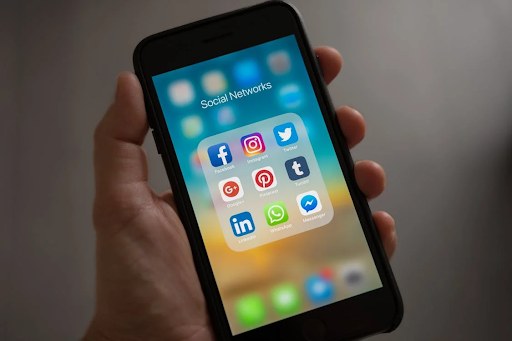Social Media and Adolescent Mental Health

(Photo Source: PEXELS)
October 19, 2022
Have you ever found yourself scrolling the limitless pages of the internet and social media? And if you have done this, do you find yourself surprised at the fleeting time you’ve spent staring at information that doesn’t provide you with anything of substance?
If you said yes to these questions, you are most definitely not alone in this empty feeling. Social media and the internet are two things that have taken over the lives of young kids and teenagers, and whether or not they are beneficial to them is a debated topic in the modern age.
According to the AACAP, 90% of teenagers have used social media at one point or another in their lives. It has become the default action for many adolescents to go on their phones and look through endless pages of information and news. The New York Times states that the average amount of time teenagers spend on technology and the internet was between 7 and 8 hours, which over time proves to be a lot of meaningful time used in your life. One could assume a huge chunk of these hours spent on the internet is on social media, which begs the question: Does this time benefit your mental health or not?
Mr. Casey, an English teacher at the Pentucket Regional High School, seems to believe it does not. He states that social media is like, “eating candy, there’s no substance to social media. It’s just a sugar high.”
I would agree with him on this matter; it seems like the mindless scrolling that we all partake in as teenagers does no good to our brains. The high we get from seeing information that does not take a long time to process is extremely comparable to eating candy. The candy provides no nutrients or substance to our mind; there’s no delayed gratification or actual meaningful work taking place when you are on these apps.
Mrs. Beaton, a psychology teacher at Pentucket High School, also brings up a good point about the comparison that comes with social media. She says “Social media presents adolescents with an unrealistic and false sense of what other people’s lives look like” which she thinks causes individuals with lower confidence to have “low self-esteem and increased anxiety, and a false sense of reality.”
We all can get envious sometimes, but this frowned-upon trait of humanity can be brought out easily in social media when we needlessly compare our lives to others. These apps spawn unnecessary envy and competition among the people who use them. With social media, you are always spectating others’ lives and not making any active progress on yours.
It is clear that the “sugar high” and comparisons that come with social media have caused the mental health of the young generation to deteriorate. According to the CDC, more than 1 in 3 high school students had experienced persistent feelings of sadness or hopelessness in 2019, a 40 percent increase since 2009. The Office of Population Affairs states that 32% of people in the 13-18 age range experience some sort of anxiety disorder in their everyday lives. The connection between the increase of social media usage and the mental health problems occurring in teenagers seems to be quite apparent.
Now, what do we do with this depressing information about the harm addictive media sites can inflict on us? On a personal level, you could perhaps decrease your screen time (you may be rolling your eyes at this because it sounds like something your parents would already do) and spend more time developing habits that are good for your mental health. Reading a book, spending time outdoors by yourself or with friends, journaling, etc, are all healthy alternatives to mindlessly scrolling through social media. You could spread this valuable information to your friends and family, and maybe their eyes would open to the negative effects of the sites they are using.
Life is so precious, and any time wasted on meaningless things will be looked back at with regretful eyes. I’m not saying that you should delete all your social media accounts and never go on them again, but some sort of restriction would be so beneficial to your mental well-being. Balance and moderation are key when it comes to anything in life, so setting a screen time limit for certain apps would be a good first step. When you look back on how many hours you spent on social media as a teenager, you may be disappointed by how much you’ve truly lost by having these apps.
